七年级英语下册Unit11Howwasyourschooltrip(第4课时)SectionB(2a_3c)
七年级英语下册Unit 11 How was your school trip超全重要短语和句子(英汉対译)
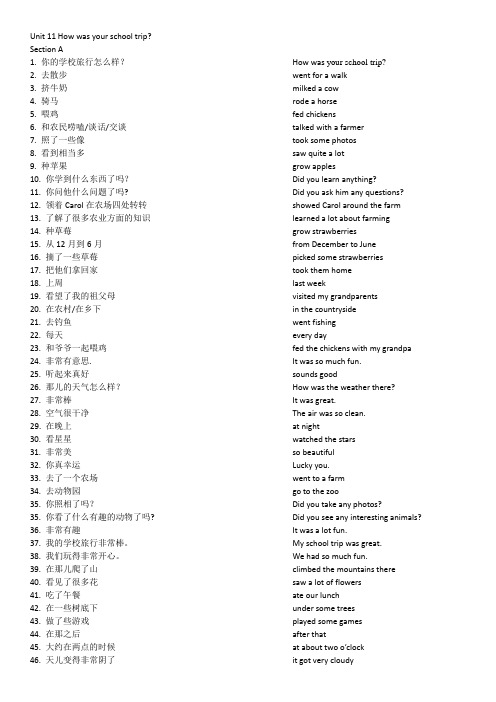
Unit 11 How was your school trip?Section A1. 你的学校旅行怎么样?How was your school trip?2. 去散步went for a walk3. 挤牛奶milked a cow4. 骑马rode a horse5. 喂鸡fed chickens6. 和农民唠嗑/谈话/交谈talked with a farmer7. 照了一些像took some photos8. 看到相当多saw quite a lot9. 种苹果grow apples10. 你学到什么东西了吗?Did you learn anything?11. 你问他什么问题了吗? Did you ask him any questions?12. 领着Carol在农场四处转转showed Carol around the farm13. 了解了很多农业方面的知识learned a lot about farming14. 种草莓grow strawberries15. 从12月到6月from December to June16. 摘了一些草莓picked some strawberries17. 把他们拿回家took them home18. 上周last week19. 看望了我的祖父母visited my grandparents20. 在农村/在乡下in the countryside21. 去钓鱼went fishing22. 每天every day23. 和爷爷一起喂鸡fed the chickens with my grandpa24. 非常有意思. It was so much fun.25. 听起来真好sounds good26. 那儿的天气怎么样?How was the weather there?27. 非常棒It was great.28. 空气很干净The air was so clean.29. 在晚上at night30. 看星星watched the stars31. 非常美so beautiful32. 你真幸运Lucky you.33. 去了一个农场went to a farm34. 去动物园go to the zoo35. 你照相了吗?Did you take any photos?35. 你看了什么有趣的动物了吗? Did you see any interesting animals?36. 非常有趣It was a lot fun.37. 我的学校旅行非常棒。
初中英语 七年级下册 Unit11How was your school trip

the trip the train
the museum
the gift shop and gifts
Helen
exciting fast
really interesting
lovely, not expensive
Jim terrible slow
big, boring, dark, too many people
2. Learn about Helen’s and Jim’s diary entries. 3. Learn to write diaries with past tense.
Lead-in
Look at the pictures and talk —I +v-ed(went to …)/ —It/That sounds…
The museum was big and boring. Everything was
about robots and I’m not interested in that.
be interested in… 对……感兴趣
hear v. 听到;听见。 用法:hear sb. do sth. 听到某人做 某事(全过程)hear sb. doing sth. 听到某人正在做某事
✓ 特殊疑问词+不定式结构可改写成由该疑问词 引导的宾语从句,改写时在疑问词后加主语 (与主句主语一致),将不定式改成“should+ 动词原形”作谓语。
You have to consider what to do next. =You have to consider what you should do next.
总的来说,相当于in a word或in short.
Unit11Howwasyourschooltrip(SectionB3a-SelfCheck)教学案(人教新目标七年级下册)
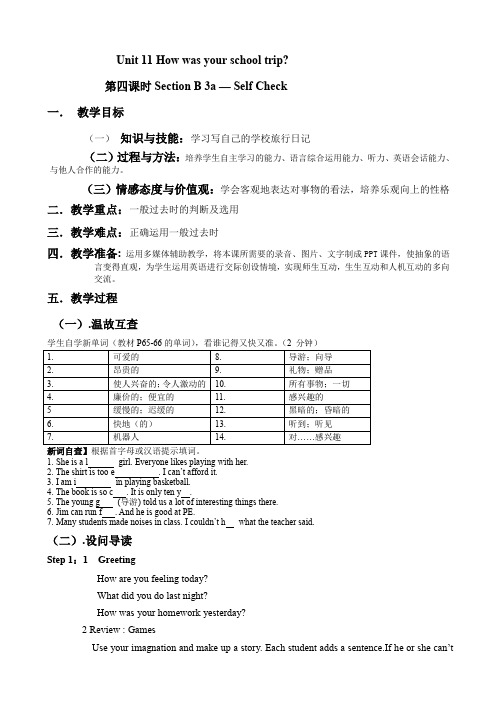
Unit 11 How was your school trip?第四课时Section B 3a — Self Check一.教学目标(一)知识与技能:学习写自己的学校旅行日记(二)过程与方法:培养学生自主学习的能力、语言综合运用能力、听力、英语会话能力、与他人合作的能力。
(三)情感态度与价值观:学会客观地表达对事物的看法,培养乐观向上的性格二.教学重点:一般过去时的判断及选用三.教学难点:正确运用一般过去时四.教学准备:运用多媒体辅助教学,将本课所需要的录音、图片、文字制成PPT课件,使抽象的语言变得直观,为学生运用英语进行交际创设情境,实现师生互动,生生互动和人机互动的多向交流。
五.教学过程(一).温故互查新词自查】根据首字母或汉语提示填词。
1. She is a l girl. Everyone likes playing with her.2. The shirt is too e. I can’t afford it.3. I am i in playing basketball.4. The book is so c . It is only ten y.5. The young g (导游) told us a lot of interesting things there.6. Jim can run f . And he is good at PE.7. Many students made noises in class. I couldn’t h what the teacher said.(二).设问导读Step 1:1 GreetingHow are you feeling today?What did you do last night?How was your homework yesterday?2 Review : GamesUse your imagnation and make up a story. Each student adds a sentence.If he or she can’tadd a sentence,he or she must sing an English song.Step 2 : Preparation1.3a Look a t the pictures of Bob’s school plete his diary entry.2. 3b Linda is Bob’s classmate. Complete her diary entry.Step 2 : Writing3c Now write a diary entry for your own school trip.Explain if you liked it or didn’t like it a nd why.Step 3 : Self-check1 Write more verbs and their past forms in each group.2 Complete the conversations with the correct forms of the verbs in the box.3 Check the answers4 Grammar: The Simple Past Tense(三)自我检测Mike’s summer vacationOn July 18th,2012, Mike and his parents went to Qingdao, a city in Shandong for summer vacation. Qingdao is a beautiful city with sea.It was about 12:00 when they arrived there on the first day. They found a hotel and had a short rest. It was really hot and they decided to go to the beach. At about 3:30 pm, they got to the beach. There were many people there. Some were lying on the beach and many children were playing in the water. Mike was playing with them and he was very happy. His parents also felt relaxed. About two hours later, they went back to the hotel.On the second day, it rained all day. Mike visited the history museum with his father and his mother went shopping.On July 20th, they went to Laoshan Mountain in the morning and took a bus home in the afternoon. They were tired but happy.( ) 1. Where did Mike’s family go on vacation? A. To Shanghai. B. To Tianjin.C. To Qingdao.( ) 2. What did Mike’s father do on July 19th?A. He swam in the sea.B. He visited the history museum.C. He went shopping with Mike’s mother.( ) 3.How long was their vacation? A. One day. B. Two days. C. Three days.( ) 4. How did they go back home? A. By train. B. By bus. C. By plane.( ) 5. Which of the following is true?A. It rained on July 19th.B. They went shopping on July 20th.C. Mike didn’t play in the water on the first day.(四).巩固训练:一、阅读理解。
人教版七年级下册 Unit 11 How was your school trip 知识点(适合于听写 学生对照背诵)-带答案

人教版七年级下册Unit 11 How was your school trip 知识点1.把...喂给...用...喂养...以...为食...2.一个能干的农夫正在他的大农场耕作。
3.在农场周围散步4.许多/ 许许多多的5.我有很多事情要告诉你。
6.相当漂亮的一个女孩(quite / very )7.你知道关于他的一些事吗?8.带领某人参观某地9.show up / show off / on show10.看见一些有趣的事情11.从某人哪里学到很多关于12.名词前有哪些词时,无介词13.一名优秀的运动员在...方面优秀14.幸运的是,我们及时上了汽车。
15.一般过去时的标志词16.蛮好玩17.你说的太多了18.so many 和so much的区别19.很开心做某事20.担忧某事(worry)2种e out 的含义3种22.天气变得非常的晴朗。
23.长得很好/ 长大/种植水稻24.绘画/ 油画25.去旅行(2种)26.到...去旅行/ 去度假27.沿途/ 顺便问一下/ 以这种方式28.教我们如何制作机器人教某人如何做某事29.教某人某事30.我不知道去哪里/做什么/怎么做31.北京房子的价格很高。
32.总的来说33.让人兴奋的一天34.今天的学校旅行/五分钟的路程35.复合不定代词36.对...感兴趣/37.听到某人做某事/听到某人正在做某事38.不客气(all)39.作文构思40.你的学校旅行怎么样?41.去散步42.给奶牛挤奶43.骑马44.喂鸡45.与农民交谈46.拍一些照片47.带领Alice参观农场48.学习了很多关于农务49.从十二月到六月种植草莓50.摘一些草莓51.带他们回家52.你上周旅行怎么样?54.我去农村拜访我爷爷奶奶了。
55.你做什么了?56.我晚上观看星星了。
57.你真幸运。
58.你去动物园了吗?不,我没有。
我去了农场。
59.你看到一些牛了吗?是的,看到了。
我看到了很多。
2020年春七年级英语下册Unit11Howwasyourschooltrip(第4课时)分层训练(新版)人教新目标版
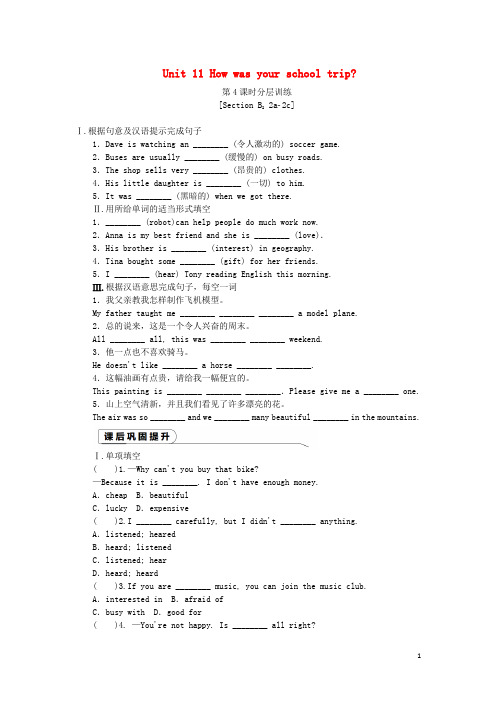
Unit 11 How was your school trip?第4课时分层训练[Section B2 2a2c]Ⅰ.根据句意及汉语提示完成句子1.Dave is watching an ________ (令人激动的) soccer game.2.Buses are usually ________ (缓慢的) on busy roads.3.The shop sells very ________ (昂贵的) clothes.4.His little daughter is ________ (一切) to him.5.It was ________ (黑暗的) when we got there.Ⅱ.用所给单词的适当形式填空1.________ (robot)can help people do much work now.2.Anna is my best friend and she is ________ (love).3.His brother is ________ (interest) in geography.4.Tina bought some ________ (gift) for her friends.5.I ________ (hear) Tony reading English this morning.Ⅲ.根据汉语意思完成句子,每空一词1.我父亲教我怎样制作飞机模型。
My father taught me ________ ________ ________ a model plane.2.总的说来,这是一个令人兴奋的周末。
All ________ all, this was ________ ________ weekend.3.他一点也不喜欢骑马。
He doesn't like ________ a horse ________ ________.4.这幅油画有点贵,请给我一幅便宜的。
七年级英语下册Unit11Howwasyourschooltrip说课稿(人教新目标版)
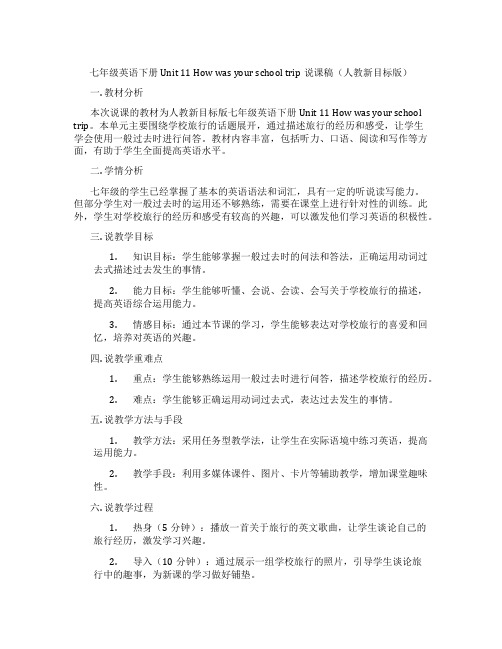
七年级英语下册 Unit 11 How was your school trip说课稿(人教新目标版)一. 教材分析本次说课的教材为人教新目标版七年级英语下册Unit 11 How was your school trip。
本单元主要围绕学校旅行的话题展开,通过描述旅行的经历和感受,让学生学会使用一般过去时进行问答。
教材内容丰富,包括听力、口语、阅读和写作等方面,有助于学生全面提高英语水平。
二. 学情分析七年级的学生已经掌握了基本的英语语法和词汇,具有一定的听说读写能力。
但部分学生对一般过去时的运用还不够熟练,需要在课堂上进行针对性的训练。
此外,学生对学校旅行的经历和感受有较高的兴趣,可以激发他们学习英语的积极性。
三. 说教学目标1.知识目标:学生能够掌握一般过去时的问法和答法,正确运用动词过去式描述过去发生的事情。
2.能力目标:学生能够听懂、会说、会读、会写关于学校旅行的描述,提高英语综合运用能力。
3.情感目标:通过本节课的学习,学生能够表达对学校旅行的喜爱和回忆,培养对英语的兴趣。
四. 说教学重难点1.重点:学生能够熟练运用一般过去时进行问答,描述学校旅行的经历。
2.难点:学生能够正确运用动词过去式,表达过去发生的事情。
五. 说教学方法与手段1.教学方法:采用任务型教学法,让学生在实际语境中练习英语,提高运用能力。
2.教学手段:利用多媒体课件、图片、卡片等辅助教学,增加课堂趣味性。
六. 说教学过程1.热身(5分钟):播放一首关于旅行的英文歌曲,让学生谈论自己的旅行经历,激发学习兴趣。
2.导入(10分钟):通过展示一组学校旅行的照片,引导学生谈论旅行中的趣事,为新课的学习做好铺垫。
3.新课呈现(15分钟):讲解一般过去时的问法和答法,示例说明如何用动词过去式描述过去发生的事情。
让学生跟读、模仿,确保正确掌握。
4.实践环节(15分钟):学生分角色扮演,模拟学校旅行的场景,运用一般过去时进行问答。
人教七下Unit 11 How was your school trip?知识点

Unit 11 How was your school trip?Section A1. How was your trip yesterday?(1)本句为询问某事情况的常用句型,其中was是be动词的过去式,如果询问当前的情况则be动词用is。
其答语常用:It was great! (好极了) / It was OK.(还可以)/ It wasn’t good.(不好。
)/ All right.(很好。
)/ It was not bad.(还不错。
)等。
How + be+…?相当于What + be +… + like? 例如:-How was her holiday?-It was not bad.(2)How是疑问副词,意为“如何,怎样”,常用来引导特殊疑问句来询问方式、程度、状况等。
常用于以下交际用语中:1)How is/are +sb. ? 用来询问人的身体、工作、学习或生活等的状况。
例如:-How are you? -Fine, thank you.2)How is/are +sth.?用来询问某物或者某事的状况如何。
例如:How is your work?3)How do you do? 并不表示疑问,是第一次见面时的问候语,回答仍用此句。
例如:How do you do? ---How do you do?4)How is it going?/ How is everything going? 用来询问事情进展如何。
例如:How is it going? Very well./ Not too bad./just so so.2. feed chickenfeed 作及物动词,意为“喂养,饲养”,其后常接表示动物名称的词作宾语。
例如:My father’s job is to feed the animals.拓展:(1)feed..to…意为“把……喂给……吃”。
feed后接饲料或者食物名称做宾语,to为介词,其后一般接动物或者小孩等名词表示对象。
2020年人教版七年级英语下册Unit11 How was your school trip 要点详解
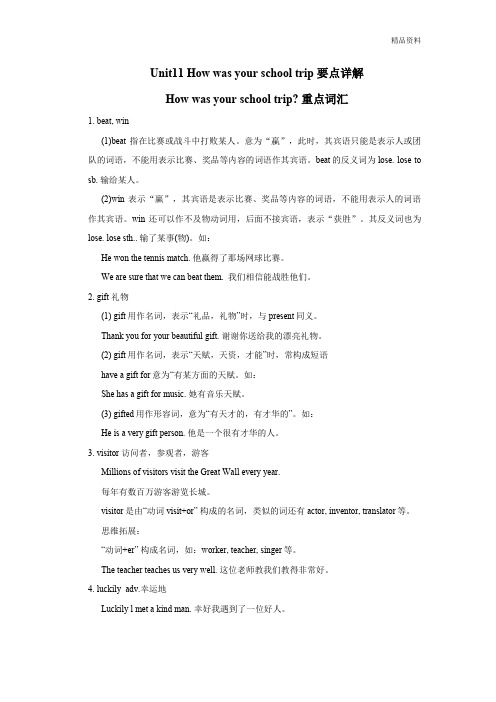
Unit11 How was your school trip 要点详解How was your school trip? 重点词汇1. beat, win(1)beat指在比赛或战斗中打败某人。
意为“蠃”,此时,其宾语只能是表示人或团队的词语,不能用表示比赛、奖品等内容的词语作其宾语。
beat的反义词为lose. lose to sb. 输给某人。
(2)win表示“赢”,其宾语是表示比赛、奖品等内容的词语,不能用表示人的词语作其宾语。
win还可以作不及物动词用,后面不接宾语,表示“获胜”。
其反义词也为lose. lose sth.. 输了某事(物)。
如:He won the tennis match. 他赢得了那场网球比赛。
We are sure that we can beat them. 我们相信能战胜他们。
2. gift 礼物(1) gift用作名词,表示“礼品,礼物”时,与present同义。
Thank you for your beautiful gift. 谢谢你送给我的漂亮礼物。
(2) gift用作名词,表示“天赋,天资,才能”时,常构成短语have a gift for意为“有某方面的天赋。
如:She has a gift for music. 她有音乐天赋。
(3) gifted用作形容词,意为“有天才的,有才华的”。
如:He is a very gift person. 他是一个很有才华的人。
3. visitor 访问者,参观者,游客Millions of visitors visit the Great Wall every year.每年有数百万游客游览长城。
visitor是由“动词visit+or”构成的名词,类似的词还有actor, inventor, translator等。
思维拓展:“动词+er”构成名词,如:worker, teacher, singer等。
The teacher teaches us very well. 这位老师教我们教得非常好。
2014年春人教版七年级下册Unit 11 How was your school trip?period 4
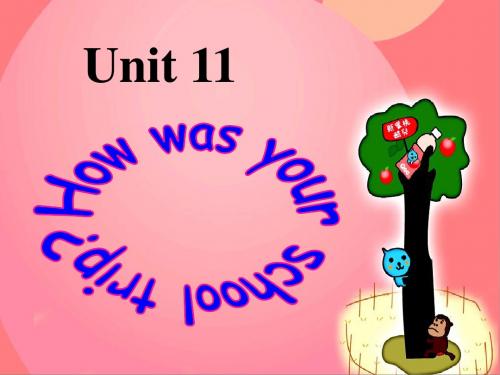
It’s a robot .
She is a guide .
It’s a gift shop.
It’s very dark now.
She heard someone singing in the room.
He is interesting in dancing.
2a
Do the following words describe good things or bad things? Put a √ for good and an X for bad. Leave a blank if they can mean both.
Let’s learn
It’s a lovely cat.
They’re expensive flowers.
After the exciting new, he cried loudly.
She wears a cheap skirt.
It walks very slow.
It runs very fast .
Unit 11
Section B 2a~Self Check
Guess :
Where did I go ?
What did I do there?
store
Went shopping
What did I buy?
What did you do last weekend?
slept late
read a book
had ice cream
played computer games
went shopping
My What National did I do Day last vacation weekend? activities
人教版七年级英语下册Unit11Howwasyourschooltrip教案设计

⼈教版七年级英语下册Unit11Howwasyourschooltrip教案设计UNIT11 How was your school trip?Section A 第1课时(1a?1c)⾃主学习⽅案1.⾃学⽣词,并记住拼读及拼写。
2.预习课本找出重点短语及句⼦。
(见学案⾃学导练内容)3.读记后完成⾃学导练内容。
课堂导学⽅案Step1 情景导⼊Teacher:We had a school trip last week. Did you have a good time? How was your school trip?Students : Not bad/Pretty good/Great/Terrible.Teacher :Did you take any photos?Did you feed chickens?What did you do? Please tell us what you did. Do you want to know what Carol did?环节说明:以上周的校游为话题,引出⼀般过去时态,简洁明了,直奔主题。
Step 2完成教材1a-1c的任务1.认真观察图⽚,将图⽚和la中所给的短语匹配。
集体核对答案,完成la。
(2分钟)2.教师领读la中的词组,学⽣跟读并且识记,然后两⼈⼀组互相提问。
以⼩组为单位总结动词过去式的构成规则,教师补充点拨。
(5分钟)3.⼤声朗读图⽚中的⼩对话,提前感知听⼒内容。
(2分钟)4.认真听录⾳,圈出Carol在校游时所做的事情,集体核对答案,完成lb的听⼒任务。
(3分钟)5.练习lc中的对话,并请学⽣表演。
(2分钟)6.模仿lc中的对话,利⽤la中的图⽚信息,两⼈⼀组来谈论Carol在校游时所做的事情,邀请⼏组学⽣来表演对话。
(4分钟)参考案例:A:Did Carol take any photos?B:Yes,she did. /No,she didn’t.7.⼩结训练。
人教七年级英语下《Unit11HowwasyourschooltripPeriod4》
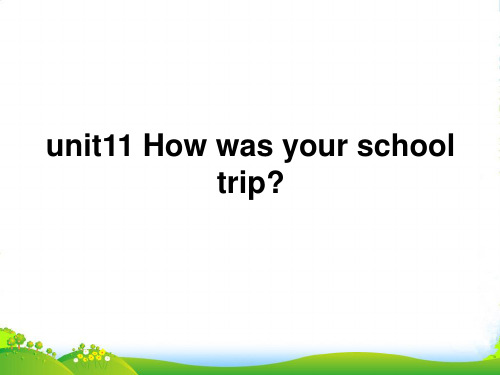
5. My father often
(swim)in this river when he was
young.
答案: 1. was 2. Were 3. visited 4. rode 5. swam
Ⅱ. 句型转换
1. She was a dancer 10 years ago. (改为否定句)
She
的消息时, 每个人激动不已。excited人感到兴奋, 修饰人;
exciting令人兴奋的, 指物体令人兴奋, 修饰物, 故选B。
【习作在线】 四练笔巩固--1师友练笔
请根据下表提示, 以“A Great School Trip”为题写一篇
英语短文, 介绍七年级一班去泰山(Mount Tai)校游的情况。
3. 昨天他参加了学校旅游。
He
a school trip yesterday.
4. 母亲教我如何做早饭。
My mother
me
cook breakfast.
5. 他一点也不喜欢这次旅行。
He
like the trip
.
答案: 3. went on 4. taught; how to 5. didn’t; at all
19. along the way 沿线
20. after that 之后 21. buy sth. for sb. 为某人买某物
22. all in all 总的来说 23. take a / the train 乘火车
一、知识回顾 ---2. 教师点评
【语法总结】一般过去时 (一)一般过去时的定义 一般过去时表示过去某个时间发生的动作或存在
→
(adv. )幸运地; 好运地
7. paint(v. )
人教版七年级英语下册Unit 11 第4课时(B 2a-2c)优质课件

令人兴奋的; 我看了一场令人兴奋的足球赛。
John went to _m__u_s_e_u_m__. The trip is _b_o_r_i_n_g__.
John
Alice went to _t_h_e_f_a_r_m__. She saw many _a_n_i_m__a_ls_. The trip is _g_r_e_a_t .
Alice
_______ trip was terrible.
A. a; /
B. a; the
C. the; a
D. the; /
2. Then the guide taught us how to make a model robot. ✓ guide名词,意为“导游;向导”,为可数名 词。 ✓ guide作动词时,意为“指引;给某人领路”。
2a
Do the following words describe good things or bad things? Put a√ for good and an×for
bad. Leave a blank if they can mean both.
_√__ interesting _×__ difficult _√__ lovely _×__ slow
photos.
Mind map
The trip to the _sc_i_e_n_c_e_m__u_s_e_u_m_
interesting & exciting
terrible & boring
The train was __fa_s_t__.
The train was _sl_o_w_.
She learned _a__lo_t___ about _r_o_b_o_t_s_.
人教版七年级英语下册 Unit11How was your school trip_重点知识点
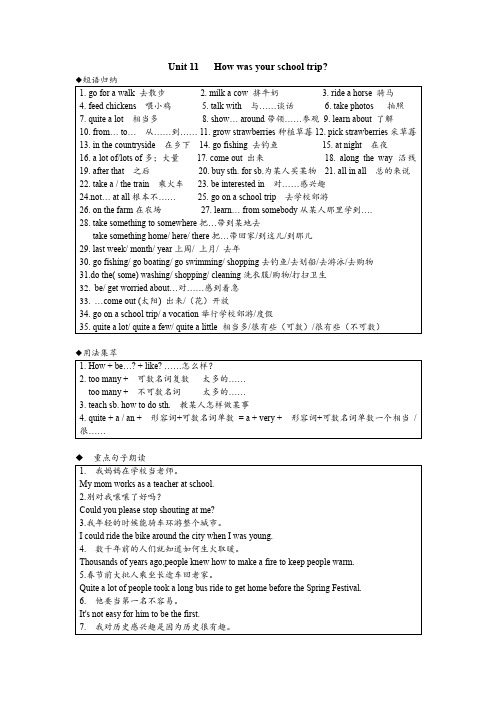
18.乘火车我们很快就到了那儿。
We got there so fast by train.
19.沿途我们看见了些农场和村庄。
We saw some farms and villages along the way.
20.我不知道它们还有本事和我们下棋。
◆用法集萃
1. How + be…? + like? ……怎么样?
2. too many +可数名词复数太多的……
too many +不可数名词太多的……
3. teach sb. how to do sth.教某人怎样做某事
4. quite + a / an +形容词+可数名词单数= a + very +形容词+可数名词单数一个相当/很……
4.数千年前的人们就知道如何生火取暖。
Thousands of years ago,people knew how to make a fire to keep people warm.
5.春节前大批人乘坐长途车回老家。
Quite a lot of people took a long bus ride to get home before the Spring Festival.
22. take a / the train乘火车23. be interested in对……感兴趣
24.not… at all根本不……25. go on a school trip去学校郊游
26.on the farm在农场27. learn… from somebody从某人那里学到….
28. take something to somewhere把…带到某地去
Unit 11 How was your school trip(讲义及答案)
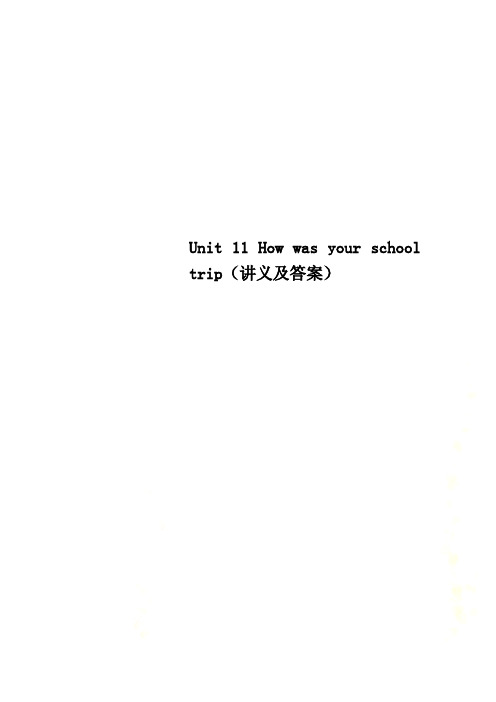
Unit 11 How was your school trip(讲义及答案)Unit 11 How was your school trip?(讲义)Part 1 Words and Expressionsmilk /mɪlk/ v. 挤奶cow /kaʊ/ n. 奶牛milk a cow 挤奶horse /hɔː(r)s/ n. 马ride a horse 骑马feed /fiːd/ v.(fed /fed/)喂养;饲养feed chickens 喂鸡farmer /'fɑː(r)mə(r)/n. 农民;农场主quite /kwaɪt/ adv. 相当;完全quite a lot (of…) 许多anything /'enɪθɪŋ/pron.(常用语否定句或疑问句)任何东西;任何事物grow /grəʊ/ v. (grew/ɡruː/)种植;生长;发育farm /fɑː(r)m/ n. 农场v. 务农;种田pick /pɪk/ v. 采;摘excellent /'eksələnt/adj. 极好的;优秀的countryside /'kʌntrisaɪd / n. 乡村;农村in the countryside 在乡下;在农村yesterday /'jestə(r)di/adv. 昨天flower /'flaʊə(r)/n. 花worry /'wʌrɪ/ v. & n. 担心;担忧luckily /'lʌkɪli/ adv. 幸运地;好运地sun /sʌn/ n. 太阳museum /mjuː'ziəm/n. 博物馆fire /'faɪə(r)/n. 火;火灾fire station 消防站painting /'peɪntɪŋ/n. 油画;绘画exciting /ɪk'saɪtɪŋ/adj. 使人兴奋的;令人激动的lovely /'lʌvli/ adj. 可爱的expensive /ɪk'spensɪv/ adj. 昂贵的cheap /tʃiːp/ adj. 便宜的;廉价的slow /sləʊ/ adj. 缓慢的;迟缓的fast /fɑːst/ adj. & adv. 快地(的)slow & fastadj. 缓慢的;迟缓的adj.& adv. 快地(的)adj.a slow driver a fast walkerI missed the fast train and had to get the slow one.adv.slowly & fastCan you speak slowly? The boy runsfast.interesting adj. 感兴趣的be interested in 对……感兴趣I am interested in music and my brother is interested in sports. We had a great time on the farm yesterday. We were interested in milking the cow.be interested in 主语通常是人,接动词时用动词的-ing 形式。
2020年春七年级英语下册Unit11Howwasyourschooltrip(第4课时)SectionB(2a_3c)课堂练习(新版)人教新目
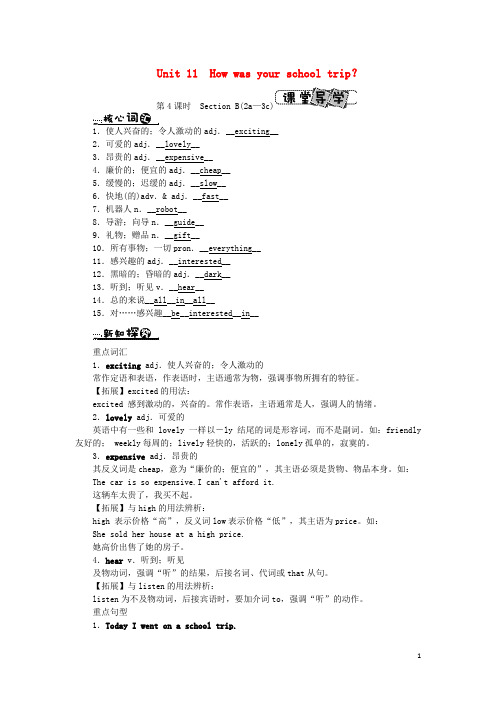
Unit 11 How was your school trip?第4课时Section B(2a—1.使人兴奋的;令人激动的adj.__exciting__2.可爱的adj.__lovely__3.昂贵的adj.__expensive__4.廉价的;便宜的adj.__cheap__5.缓慢的;迟缓的adj.__slow__6.快地(的)adv.& adj.__fast__7.机器人n.__robot__8.导游;向导n.__guide__9.礼物;赠品n.__gift__10.所有事物;一切pron.__everything__11.感兴趣的adj.__interested__12.黑暗的;昏暗的adj.__dark__13.听到;听见v.__hear__14.总的来说__all__in__all__15.对……感兴趣__be__interested__in__重点词汇1.exciting adj.使人兴奋的;令人激动的常作定语和表语,作表语时,主语通常为物,强调事物所拥有的特征。
【拓展】excited的用法:excited 感到激动的,兴奋的。
常作表语,主语通常是人,强调人的情绪。
2.lovely adj.可爱的英语中有一些和lovely一样以-ly结尾的词是形容词,而不是副词。
如:friendly 友好的; weekly每周的;lively轻快的,活跃的;lonely孤单的,寂寞的。
3.expensive adj.昂贵的其反义词是cheap,意为“廉价的;便宜的”,其主语必须是货物、物品本身。
如:The car is so expensive.I can't afford it.这辆车太贵了,我买不起。
【拓展】与high的用法辨析:high 表示价格“高”,反义词low表示价格“低”,其主语为price。
如:She sold her house at a high price.她高价出售了她的房子。
玉溪市第四中学七年级英语下册Unit11Howwasyourschooltrip第四课时Sectio
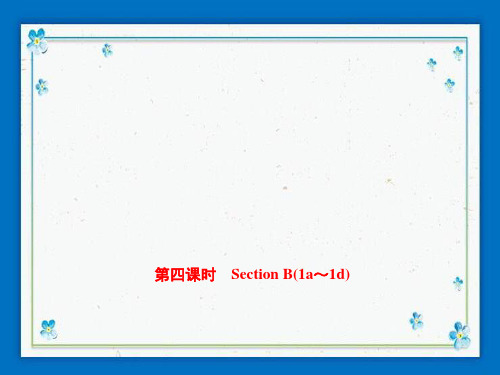
小练习 : 我不喜欢没有浴室的房子。
Expressions
Thank you for your help.
谢谢你的帮助。
Thank you for相当于Thanks for , 后接动词
形式。
eg : Thank you for your bread.谢谢你的面
C.were ; was D.were ; were
13.—__A____you at home this morning?
—No , I
.
A.Were ; wasn't B.Were ; weren't
C.Was ; wasn't D.Was ; weren't
14.Yesterday I didn't go out.I _A___pictures at home.
(二)根据句意及汉语提示完成以下单词。 6.After lunch , we went to an marutseu__m_________(博物馆). 7.Yesterday's school trip was qutiertreibl_e_________(糟透了). 8.Tony went to the art museum and saw sopmaeint_i_n_g_s_______(油画). 9.Did you ride a h_o_r_s_e_______(马)there? 10.Look ! That house is onfi_r_e_______(火).Let's call 119.
(一)根据句意用所给词的适当形式填空。 1.—___D_i_d___they _g_o_____(go)to the zoo last week? —No , they w__a_tc_h_e_d___(watch)TV at home. 2.—What __d_i_d____he ___d_o____(do)yesterday evening? —He ___s_tu_d_i_e_d___(study)for the math test. 3.—We _cl_i_m_b_e_d___(climb)a mountain last weekend.What about you —I __r_o_d_e___(ride)a horse. 4.___D_i_d____Kate ____d_o___(do)her homework yesterday evening? 5.Sally d_i_d_n_'t_s_t_u_d_y___(not study)math last term.
人教版 七年级英语 下册 Unit_11_How_was_your_school_trip

2d Role-play the conversation.
巧记一般过去时
动词一般过去时,表示过去发生事; be用was或用were, have, has变had; 谓语动词过去式,过去时间坐标志; 一般动词加-ed,若是特殊得硬记。 否定句很简单,主语之后didn’t添; 疑问句也不难,did放在主语前; 如果谓语之前有did,谓语动词需还原; 动词若是was,were,否定就把not添。
to June. T F
4 The farmers don’t grow apples. T F
5 Carol picked some strawberries
and took them home.
TF
2c Ask and answer questions about Carol’s visit to the farm. A: What did Carol do? B: She picked some strawberries.
Unit 11
How was your school trip?
Phrases
milk a cow
go for a walk ride a horse
talk with a farmer
pick strawberries
feed chickens
take some photos
visit my grandparents go fishing
2021年1月18日
13
2一般过去时的结构:
(1).主系表 S+was/were+P (2).主谓(宾)S+Ved+(O) (3).There be There was/were+某人、某物+某地、某时
- 1、下载文档前请自行甄别文档内容的完整性,平台不提供额外的编辑、内容补充、找答案等附加服务。
- 2、"仅部分预览"的文档,不可在线预览部分如存在完整性等问题,可反馈申请退款(可完整预览的文档不适用该条件!)。
- 3、如文档侵犯您的权益,请联系客服反馈,我们会尽快为您处理(人工客服工作时间:9:00-18:30)。
Unit 11 How was your school trip第四课时Section B(2a~3c)&Self Check1.Key words and phrases:exciting,lovely,expensive,cheap,slow,fast,robot,guide,gift,everything,interested,dark,hear,all in all,be interested in…2.Key sentences:(1)We visited the science museum and it was really interesting.(2)After that,I went to the gift shop and bought some lovely gifts for my parents.3.Skills:学会对自己的旅行进行描述。
4.Emotion:交流旅行心得,了解他人。
5.The guidance of learning methods【学法指导】让学生围绕着课堂任务在小组中分工合作,在活动中相互探讨、相互交流、相互合作。
6.Learning important and difficult points【学习重难点】根据文章找寻关键信息,提高阅读能力。
(一)自主学习1.根据图片和文章标题等,预测新课内容。
2.根据音标拼读单词并牢记。
3.自学短文,勾画出重点和疑难点。
【效果自测】翻译下列单词及词组。
1.exciting激动人心的2.可爱的lovely3.慢的(快的)slow(fast)4.昂贵的(便宜的)expensive(cheap)5.下棋play__chess6.坐火车by__train7.model robot模型机器人8.对……感兴趣be__interested__in9.总的说来all__in__all10.not…at all根本不,一点也不(二)课堂导学Step 1情景导入Interview:(1)Have students bring their own photos.The photos should be about their last trips.Ask the students in Group 1 to exchange the photos with the students in Group 2.So does Group 3 & Group 4.(2)Suppose the students in Group 2 and Group 4 are famous persons.Give the students in Group 1 and Group 3 three minutes to interview the famous persons according to the photos.(3)Call out some students to act it out.See who are the best actor and actress.(Here are some suggestions for the reporters to interview the famous persons.)I am a reporter from CCTV9.Now I am going to interview…How was your last trip?Did you go…?/Where did you go?Were there…?What did you do there?Did you see…there?Did people there ask for your autograph?环节说明:通过采访活动,提供真实的语言环境,激起了同学们说英语的欲望,调动学生学习的积极性与主动性,让同学们掌握并灵活运用一般过去时来描述自己的学校旅行,巩固本单元的语言基础知识。
Step 2完成教材2a~2c的任务1.阅读2a中的材料,并完成2a的任务。
(2分钟)Teacher:First,let's learn the words.These words are used for describing something.They are used to describe good things or bad things.Can you tell me which of the words in 2a are used to describe good things or bad things?2.阅读2b中的材料,并完成2b的任务。
(5分钟)Teacher:Helen and Jim went on a school trip on June 15th.They wrote a diary about it.Please read them and underline the positive adjectives and circle the negative adjectives.3.再次阅读2b中的材料,完成2c的任务。
(3分钟)Teacher:How do Helen and Jim describe these things?Please read the diaries again and complete the chart.4.讲解2b材料中的重点单词与句子,然后让学生大声朗读材料,并注意日记的书写格式。
(4分钟)5.小结训练。
(5分钟)环节说明:通过本单元话题的阅读训练,扩大学生的词汇量,培养学生的阅读能力,提高学生的阅读水平与技巧,同时巩固本单元所学的重点单词、短语与句子。
Step 3完成教材3a~3c的任务1.根据图片提示,完成3a的任务。
(2分钟)Teacher:These are the pictures of Bob's school trip.According to the pictures,please help Bob complete his diary entry.2.根据图片信息和Bob的日记,完成3b的任务。
(3分钟)Teacher:Linda is Bob's classmate.She went to the zoo with Bob on their school trip.Can you also help her complete her diary entry?3.根据3a和3b的日记写作模式,完成3c的写作任务。
(5分钟)Teacher:Now write a diary entry for your own school trip.You should tell us whether you liked it or not.And why you liked/disliked it?4.写作训练。
(6分钟)书面表达。
假如你是Kevin,正和朋友们在北京旅游。
请给你父母写一封电子邮件,告诉他们你在北京旅游的情况。
要求:语句通顺、前后连贯;60词左右。
邮件的开头已经给出。
From:kevin@ To:hbmrs@Subject:Trip Date:July 15,2017Dear Mom and Dad,I am writing this email to tell you my trip to Beijing.Beijing__is__very__big.Every__morning__I__go__for__a__walk__with__Danny__and__Jenny__at__T ian'anmen__Square.Yesterday__we__went__to__the__Great__Wall.The__weather__was__a__little__bit__hot __but__we__still__had__fun__playing__on__it.This__morning__we__went__to__the__Palace__Museum__and_ _we__had__Beijing__Roast__Duck__for__lunch.It__was__very__delicious.People__in__Beijing__are__very __friendly__and__often__help__us__find__ways.We__decided__to__go__to__the__Summer__Palace,Wangfujing__Street__and__many__other__places__in__the__next__three__days.I__think__we'll__have__a_ _good__time.See you soon.Love,Kevin环节说明:通过阅读与写作训练相结合,进一步让学生巩固本单元所学的一般过去式,并灵活运用到口语与写作中去,提高学生的口语表达与写作能力。
Step 4完成教材Self Check的任务1.复习巩固动词过去式的构成,完成第一题。
(2分钟)Teacher:In this unit,we learned past forms of verbs and used them to describe the past things.Please write more verbs and their past forms in each group.教师对规则动词和不规则动词的过去式进行归纳、总结,帮助学生记忆动词过去式。
2.选用方框内的单词,用其适当的形式,完成第二题。
(3分钟)Teacher:Now,please complete the conversations with the correct forms of the verbs in the box.3.小结训练。
(4分钟)根据所给词汇及图片提示造句。
(1)yesterday afternoon,Jack,helped,mother,hisJack__helped__his__mother__clean__the__room__yesterday__afternoon.(2)not,did,Tina,last nightTina__didn't__do__her__homework__last__night.(3)the,last Saturday,Miller,did,familyDid__the__Miller__family__go__to__the__beach__last__Saturday?(4)last weekend,Ted,his,friends,withLast__weekend__Ted__played__soccer__with__his__friends.(5)Linda,for,two,hours,yesterday morning,didDid__Linda__play__tennis__for__two__hours__yesterday__morning?环节说明:通过各种题型的练习加强对一般过去时的巩固与拓展,并对本单元所学的单词、词组与句子进行归纳、总结,并灵活运用到听、说、读、写的各项训练中,为整个单元的学习画上一个圆满的句号。
